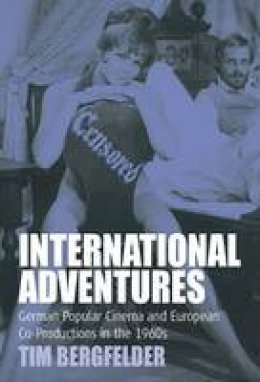
Stock image for illustration purposes only - book cover, edition or condition may vary.
International Adventures: German Popular Cinema and European Co-Productions in the 1960s (Film Europa)
Tim Bergfelder
€ 149.41
FREE Delivery in Ireland
Description for International Adventures: German Popular Cinema and European Co-Productions in the 1960s (Film Europa)
Hardcover. This account of the popular German film industry, its main protagonists, and its production strategies in the 1960s; challenges traditional assumptions. The most striking phenomenon of 1960s' popular German cinema: the disappearance of any explicit reference to contemporary German reality. Series: Film Europa. Num Pages: 15 ills, Bibliog., index. BIC Classification: 1DFG; 3JJPK; APF; JFCA. Category: (P) Professional & Vocational; (U) Tertiary Education (US: College). Dimension: 162 x 241 x 22. Weight in Grams: 530.
West German cinema of the 1960s is frequently associated with the emergence of a new generation of filmmakers, collectively known by the 1970s as the New German Cinema. Yet for domestic and international audiences at the time, German cinema primarily meant popular genres such as exotic adventure films, Gothic crime thrillers, westerns, and sex films, which were dismissed by German filmmakers and critics of the 1970s as Daddy's Cinema. International Adventures provides the first comprehensive account of these genres, and charts the history of the West German film industry and its main protagonists from the immediate post-war years to its boom period in the 1950s and 1960s. By analyzing film genres in the context of industrial practices, literary traditions, biographical trajectories, and wider cultural and social developments, this book uncovers a forgotten period of German filmmaking that merits reassessment. International Adventures firmly locates its case studies within the wider dynamic of European cinema. In its study of West German cinema's links and co-operations with other countries including Britain, France, and Italy, the book addresses what is perhaps the most striking phenomenon of 1960s popular film genres: the dispersal and disappearance of markers of national identity in increasingly international narratives and modes of production.
Product Details
Publisher
Berghahn Books
Format
Hardback
Publication date
2004
Series
Film Europa
Condition
New
Weight
530g
Place of Publication
Herndon, United States
ISBN
9781571815385
SKU
V9781571815385
Shipping Time
Usually ships in 15 to 20 working days
Ref
99-15
About Tim Bergfelder
Tim Bergfelder is a Lecturer in Film Studies at the University of Southampton. He is the co-editor of The German Cinema Book (BFI, 2001), and he has published widely on German and European cinema.
Reviews for International Adventures: German Popular Cinema and European Co-Productions in the 1960s (Film Europa)
Tim Bergfelder has written an excellent and in many aspects exemplary book, which leaves, also without daring theses, a lasting impression. Bergfelder invites the reader to reflect on film-historical categories and methods and to re-examine a subject that turns out not to be all that familiar.
Filmblatt Drawing a picture of the German cinema of the 1960s as a blatantly commercial and truly internationally minded culture industry, Bergfelder's elegantly written and convincingly argued book not only provides an overdue counterweight to the conventionally narrow focus on the Young or 'New German Cinema' as one of the best-known pedigrees of European art cinema to emerge in the 1960s - a book that cannot be praised enough for opening up entirely new horizons in the study of German and European cinema.A
Historical Journal of Film, Radio and Television - the entire book is original, provocative, and informative, and Bergfelder's argument is powerful.
Choice
Filmblatt Drawing a picture of the German cinema of the 1960s as a blatantly commercial and truly internationally minded culture industry, Bergfelder's elegantly written and convincingly argued book not only provides an overdue counterweight to the conventionally narrow focus on the Young or 'New German Cinema' as one of the best-known pedigrees of European art cinema to emerge in the 1960s - a book that cannot be praised enough for opening up entirely new horizons in the study of German and European cinema.A
Historical Journal of Film, Radio and Television - the entire book is original, provocative, and informative, and Bergfelder's argument is powerful.
Choice
